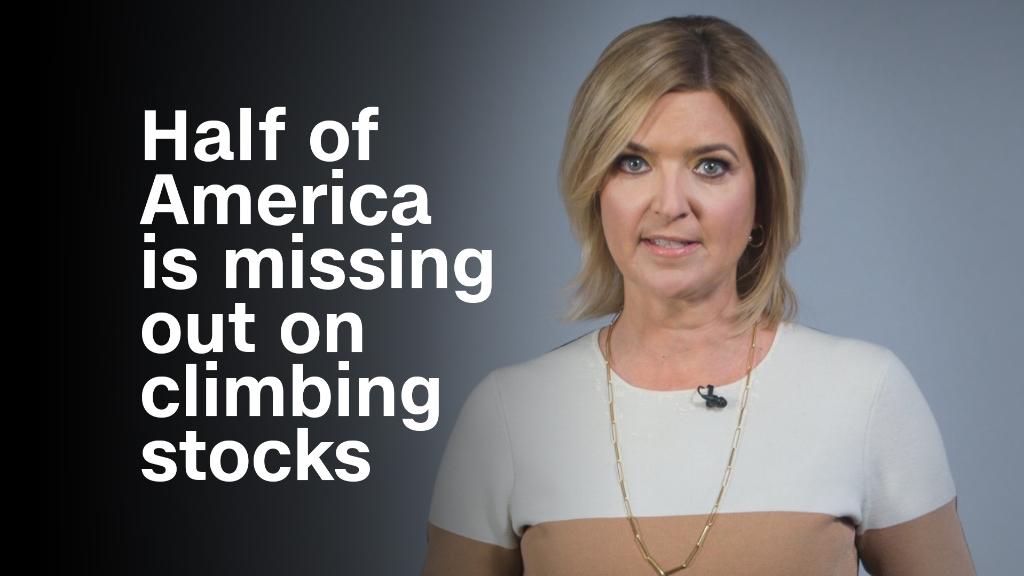
There's a plot of land sitting in North Carolina waiting for Robin Festa and her husband to build their retirement home.
She's hoping to retire early in three years at age 63 and head south from Connecticut to enjoy a lower cost of living. The pair have been dutifully socking away as much money as they can into their retirement accounts.
She's meticulous about their savings, tracking everything on a spreadsheet and checking the balances frequently — a task that has been enjoyable for the last few years as the market climbed to record highs.
But the stock market's recent volatility has made checking her balance a lot less fun. In one week in early February, they lost $30,000.
"I have to admit a tear slid from my eye," she said, referring to her balance after the Dow's worst week in two years. They were down $18,000 for February.
The couple are planning to use some of their retirement funds to build their home down South and Wall Street's recent performance has been tough on then nerves. "When things swing wildly, it upsets the apple cart," said Festa, who is a legal assistant.
Related: 1 in 5 Americans are making a terrible 401(k) mistake
Wall Street's recent dips bring back some painful memories: in 2008, they lost about $50,000 from their retirement savings. At the time, that was a significant portion of their funds. She worries it will be harder to recover another big loss so close to retirement. Her current portfolio is 60% invested in stocks and 40% in bonds.
"It's impossible to try and time the market," she said. "It's a crap shoot. To sit there and watch your money disintegrate is hard, but if you take it out and it goes up, that's not good either. It's hard." She hasn't made any changes yet to her investment strategy.
Sitting tight when Wall Street is gyrating is difficult, but financial advisers warn against making knee-jerk investment decisions.
"I jokingly say they should pass a law that no one can look at their portfolio," said Jim Saulnier, a certified financial planner in Fort Collins, Colorado. "People use short term information to make long-term decisions, and that is bad."
But now is a good time to evaluate your asset allocation. You might have intended to be 60/40 stocks and bonds, but Wall Street's run-up could have tilted the favor more toward stocks, noted Marguerita Cheng, a certified financial planner in Gaithersburg, Maryland.
"The equities markets have been outperforming the bonds, overtime they grow more, so what was 60/40 might be closer to 70/30," she said. "Don't set and forget."
Related: 3 serious problems with the 4% retirement rule
The general rule of thumb is the closer you are to retirement, the more you favor bonds over equities. For folks five years away from retirement, T. Eric Reich, a CFP in New Jersey, recommended having about 70-80% in stocks. If leaving the workforce for good is still a decade or more away, he suggested being fully invested in equities.
One way to help stomach the swings is to use dollar cost averaging, Cheng said. This strategy means you buy a pre-determined number of shares on a set schedule — regardless of market fluctuations. By investing your money gradually, it can offer some protection from market dips.
Having enough cash on hand to avoid withdrawing funds during market dips can also be reassuring to people in or close to retirement, according to Reich. That means if you are three years away from retirement, keep one year of expenses out of the market and then increase that for every year closer to retirement you get, he explained.
"We've never had more than 16 consecutive quarters of negative returns," he said. "If the market crashes the day you retire, you don't need to touch that money and can live off the cash, then in positive years I can start to replenish the three-year buffer."
Grouping your retirement savings into different buckets and investing them accordingly can also bring peace of mind and manage risk during a market freakout, explained Saulnier.
The first bucket is the cash you will need for the first two years of retirement not including any other sources of income, like a part-time job, pension or Social Security in cash.
Calculate: How much will I need for retirement?
Then divide up the rest of your retirement savings into time periods of retirement. The more time you have before you need the money, the more aggressive your investment strategy, suggested Saulnier.
"The money you are going to need to spend in the first five, 10 years of retirement that needs to be put in low volatile conservative holdings, but the money for 70, 75 and 85-year-old you to spend that can still be fully invested."
For Festa, she is keeping a close eye on Wall Street and her retirement savings. She said if she were to lose around $100,000 she would likely take a breather from the market to preserve what they have.
"I don't want to, but I could always continue to work if we had to," she said.
